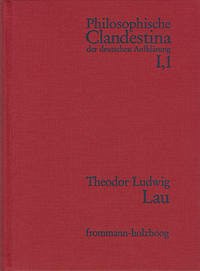Nicht lieferbar

Philosophische Clandestina der deutschen Aufklärung / Abteilung I: Texte und Dokumente. Band 1: Theodor Ludwig Lau (1670-1740).Meditationes, Theses, Dubia philosophico-theologica (1719). Dokumente
Einl. u. hrsg. v. Martin Pott
Versandkostenfrei!
Nicht lieferbar
Lau's philosophical meditations are impressive examples of a radical literature of the Enlightenment which, although only accessible to a small interested audience, had a surprising impact. Their author represents the early tradition of freethinkers who succeeded in combining independent approaches of the Germany philosophy of the early 18th century with critical ideas of other contemporary trends of thought. Lau's works advocated candid religious criticism, a pantheistic view of God and the world and a materialistic anthropology. His criticism of official philosophy and theology led to his me...
Lau's philosophical meditations are impressive examples of a radical literature of the Enlightenment which, although only accessible to a small interested audience, had a surprising impact. Their author represents the early tradition of freethinkers who succeeded in combining independent approaches of the Germany philosophy of the early 18th century with critical ideas of other contemporary trends of thought. Lau's works advocated candid religious criticism, a pantheistic view of God and the world and a materialistic anthropology. His criticism of official philosophy and theology led to his meditations being banned and to his personal persecution. These events are documented in the appendix of the volume with autobiographical material, records of his case and contemporary polemics against Lau.Laus philosophische Meditationen sind eindrucksvolle Beispiele einer radikalen Aufklärungsliteratur, die, obwohl nur einem kleinen interessierten Publikum zugänglich, dennoch von erstaunlicher Wirkung war. Ihr Autor repräsentiert jene frühe Freidenkertradition, der es gelang, eigenständige Ansätze der deutschen Philosophie des beginnenden 18. Jahrhunderts mit kritischem Ideengut anderer zeitgenössischer Denkströmungen zu vereinigen. Laus Schriften propagierten offene Religionskritik, ein pantheistisches Gottes- und Weltbild und eine materialistische Anthropologie. Seine Kritik der offiziellen Philosophie und Theologie führte zu einem Verbot seiner Meditationen und persönlicher Verfolgung; Ereignisse, die im Anhang des Bandes durch autobiographisches Material, Prozeßakten und zeitgenössische Polemiken gegen Lau dokumentiert werden.



